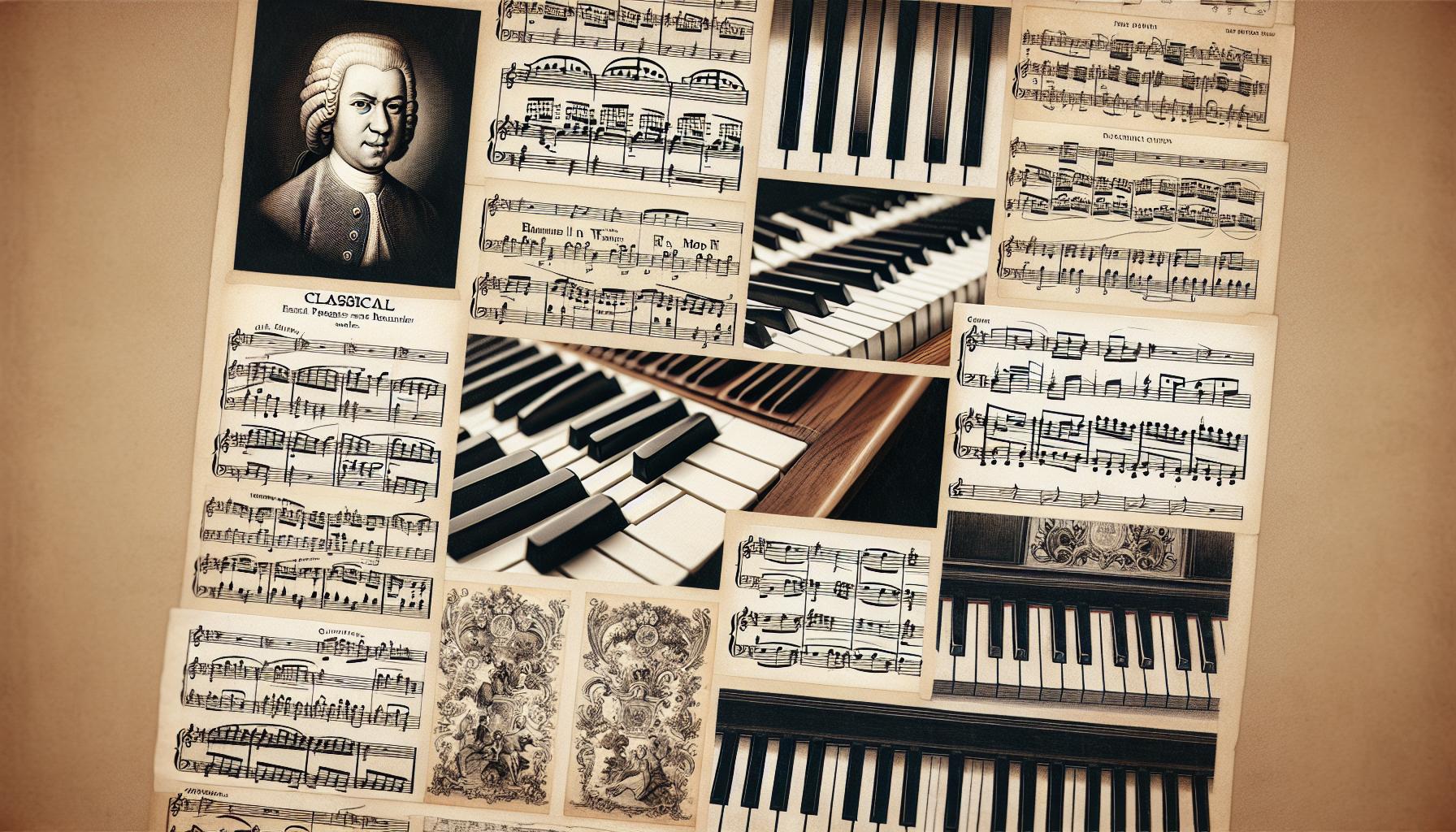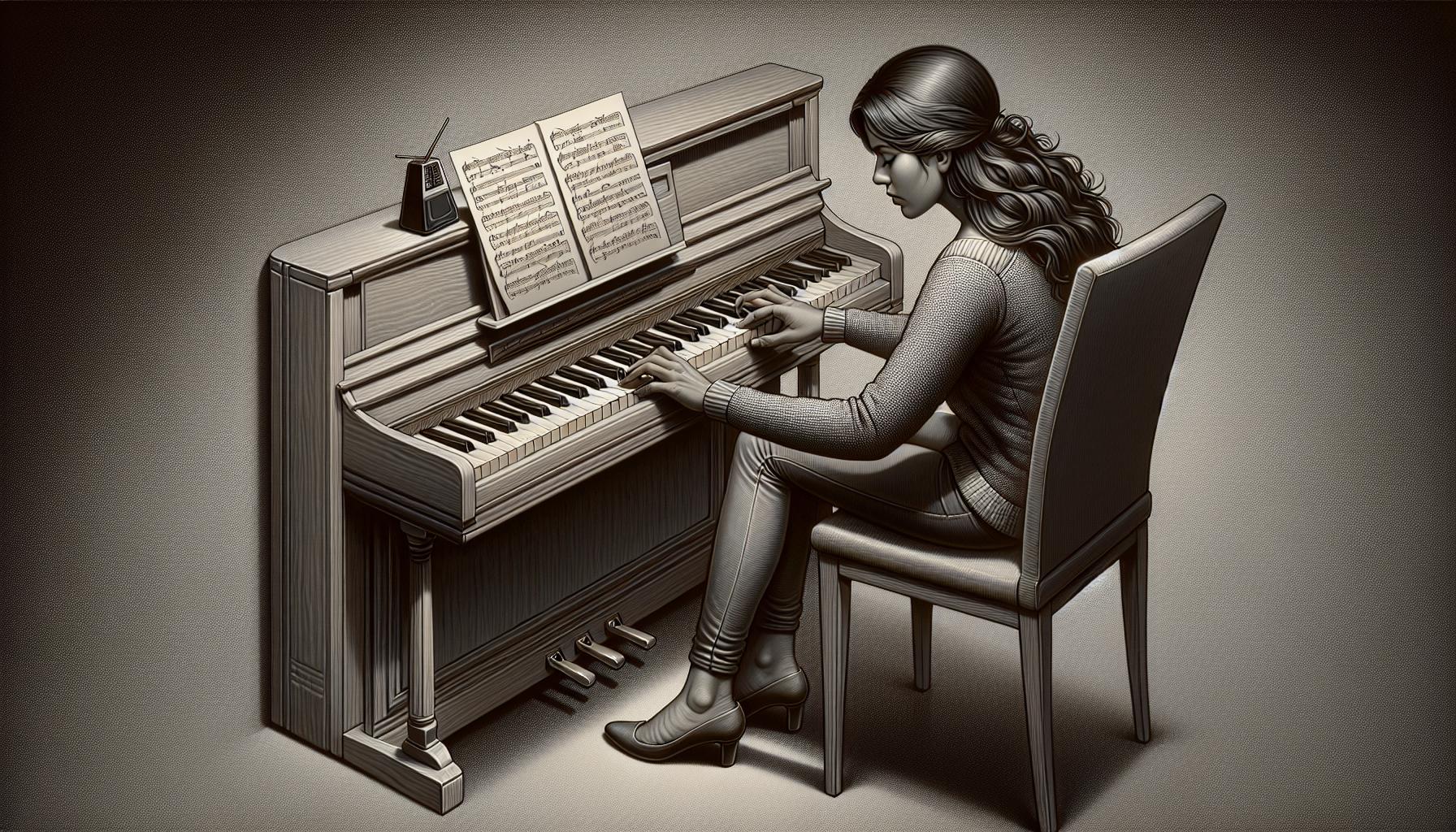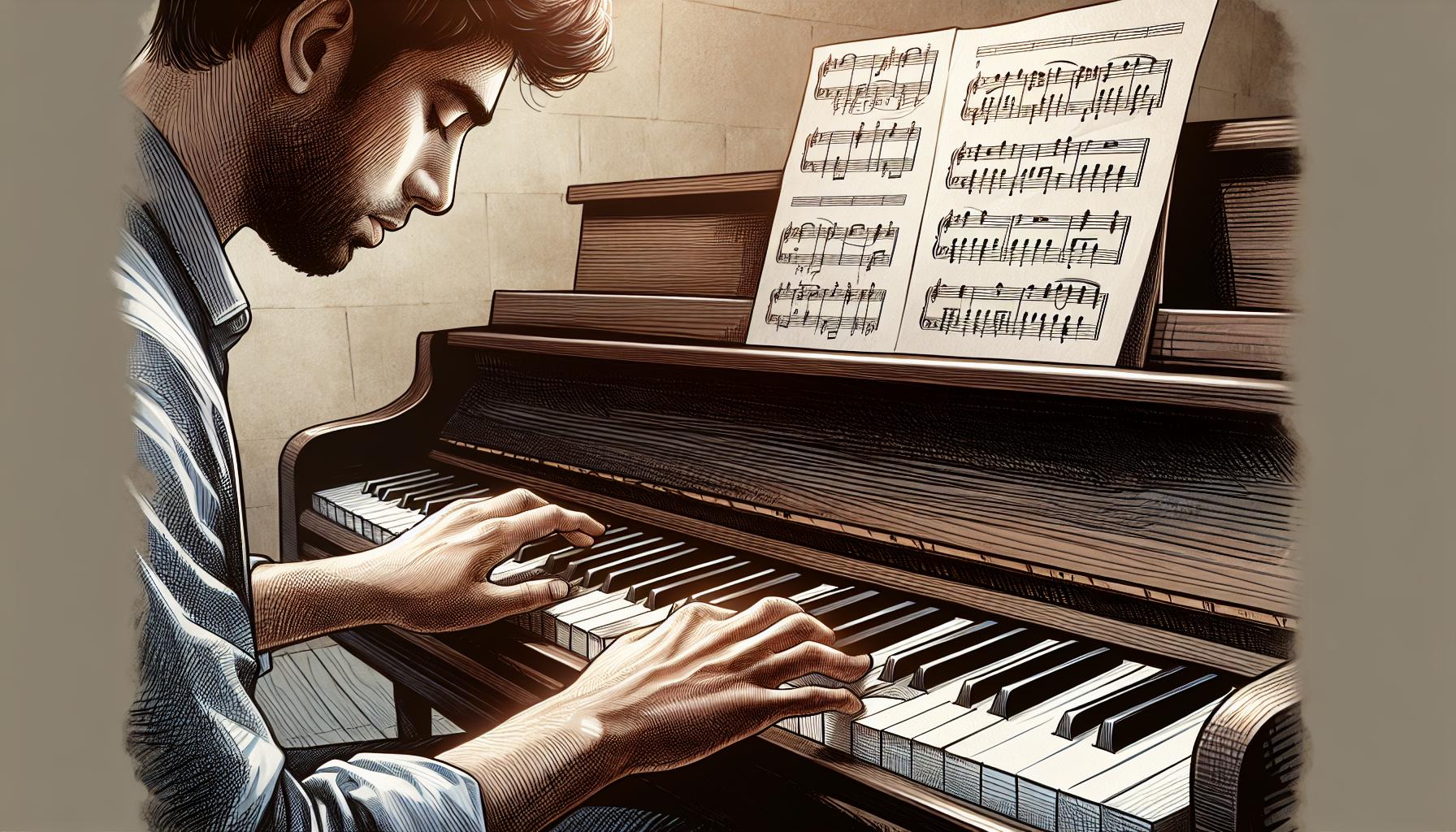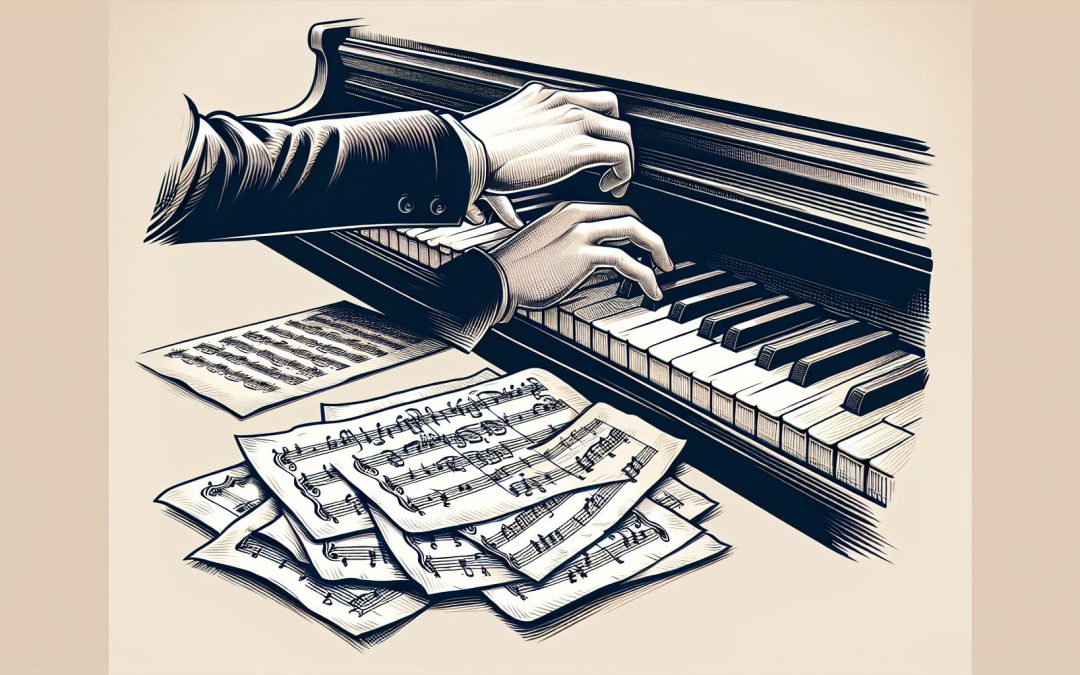Diving into the world of classical music can feel like stepping into a vast, uncharted territory, especially for beginners at the keyboard. There's something magical about the thought of your fingers dancing across the keys, producing melodies that have enchanted audiences for centuries. Yet, the question looms: where does one start?
Fortunately, the world of beginner classical keyboard sheet music is rich and inviting, offering a treasure trove of pieces that are not only beautiful but also perfectly suited for those just starting their musical journey. From the gentle, flowing lines of Bach's Minuets to the crisp, lively melodies of Mozart's Sonatas, there's a piece for every budding musician to fall in love with.
Exploring the World of Classical Music
Diving into the world of classical music can be an exhilarating experience for beginners at the keyboard. With centuries of compositions to choose from, the genre offers a vast sea of melodies that range from the profoundly deep and complex to the light and airy. For those embarking on this musical journey, the availability of beginner-friendly sheet music is a gateway to developing not only their skills but also their appreciation for classical compositions.
At the heart of classical music for beginners are the works of Johann Sebastian Bach and Wolfgang Amadeus Mozart. Bach's Minuets are often revered for their structured harmony and melody, making them excellent pieces for honing timing and technical skill. On the other hand, Mozart's Sonatas introduce beginners to more expressive playing, requiring attention to dynamics and phrasing. Both composers' works are plentiful in beginner classical keyboard sheet music collections, offering an approachable entry point into the world of classical music.
Beyond Bach and Mozart, a treasure trove of pieces by other composers like Ludwig van Beethoven, Franz Schubert, and Frédéric Chopin awaits those ready to expand their repertoire. Beethoven's "Für Elise", although a cliché, remains a favorite among beginners for its accessible yet challenging progression. Schubert's and Chopin's compositions, while potentially more demanding, serve as excellent goals for intermediate players aiming to bridge into more complex music.
Selecting the Right Pieces
Choosing the right pieces to start with is crucial for maintaining enthusiasm and progress. Beginners should look for sheet music that:
- Matches their current skill level
- Provides a challenge without being overwhelming
- Sparks interest through melody or historical significance
Instructors and online resources can be invaluable in guiding beginners through this selection process, ensuring that they find pieces that are both enjoyable and beneficial to their musical development.
The Benefits of Classical Music for Keyboard Beginners
Studying classical music offers a range of benefits for keyboard beginners. Here are some key advantages:
- Improved Technical Skills: Classical pieces often incorporate a wide range of technical skills, from finger independence to precise timing.
- Enhanced Musical Understanding: Playing through these compositions introduces beginners to foundational music theory concepts in practice, such as harmony, dynamics, and structure.
- Increased Repertoire: Learning classical music adds to a musician's repertoire, providing them with a diverse selection of pieces they can share and perform.
Benefits of Playing Classical Keyboard Sheet Music

When starting a journey into the realm of classical music on the keyboard, the benefits extend far beyond simply learning to hit the right notes. It's a voyage that promises to enrich both musical skills and personal growth. Let's explore why dipping one's fingers into the centuries-old traditions of classical keyboard sheet music can be so rewarding.
Enhanced Technical Proficiency
First and foremost, classical music is known for its complexity and depth. Even beginner pieces by composers like Bach and Mozart require a degree of precision and control that can significantly boost a player's technical abilities. From mastering the delicate touch of a Mozart Sonata to navigating the counterpoint in a Bach Minuet, players develop:
- Hand coordination
- Finger strength and dexterity
- Dynamics control
- Timing and rhythm
These skills are foundational for any pianist aiming to advance in their craft. Learning to articulate the nuances of classical compositions demands a level of discipline that pays off in all musical genres.
A Deeper Understanding of Music Theory
Classical music is rooted in the rich soil of Western music theory. By engaging with classical sheet music, learners get a hands-on education in:
- Harmony: Understanding how chords and melodies interact.
- Form: Recognizing the structure of compositions.
- Counterpoint: The art of weaving independent melodies together.
This theoretical knowledge empowers musicians to comprehend the language of music more intimately, enabling them to make more informed artistic decisions in their playing and perhaps even in their compositions.
Expanded Musical Repertoire
One of the joys of learning classical keyboard is the vast repertoire available to players of all skill levels. Starting with simpler, well-crafted pieces, beginners can gradually explore more complex works, thus continually expanding their musical horizons. This ongoing journey keeps learning fresh and exciting.
Enhanced Emotional Expression and Appreciation
Classical music is renowned for its emotional depth. Playing pieces from different eras exposes musicians to a wide range of emotional landscapes, from the profound sadness of Chopin's nocturnes to the exuberant joy of a Mozart allegro. Learning to express these emotions through music can be profoundly satisfying and can deepen one's appreciation for the subtleties of emotional expression in all forms of music.
Connection to Musical Heritage
Engaging with classical keyboard sheet music is essentially a dialogue with the past. Players connect with the thoughts and feelings of composers who lived centuries ago, gaining insights into historical contexts and cultural landscapes.
Essential Classical Pieces for Beginners

When embarking on the journey of learning classical keyboard, selecting the right repertoire is crucial. Beginners often benefit from pieces that are not only approachable in terms of technical demands but also enriching musically. These compositions serve as an ideal introduction to the world of classical music, enabling students to develop their skills and deepen their appreciation for this genre.
Bach's "Minuet in G Major", for instance, is a cornerstone piece for beginners. Originating from the Notebook for Anna Magdalena, this piece allows students to get acquainted with baroque stylistic nuances. It emphasizes hand coordination and introduces fundamental concepts of phrasing and dynamics in a very accessible manner.
Another exemplary piece that caters to early-stage pianists is Mozart's "Minuet in F Major, K. 2". Composed when Mozart was just a child, this minuet is an excellent example of classical elegance and simplicity. It provides beginners with the opportunity to explore the charm of Mozart's music while practicing precise timing and expressive playing.
For those looking to incorporate a bit of romantic flair into their repertoire, Schumann's "Album for the Young, Op. 68 - Melody", is a wonderful choice. This collection is specifically designed to nurture the musicality of young or beginner pianists, offering pieces that cover a wide range of emotions and technical challenges. "Melody" stands out for its emotive quality, teaching students the importance of playing with feeling.
Expanding the Beginner's Repertoire
As students progress, Clementi's "Sonatina in C Major, Op. 36, No. 1" becomes an essential addition to their repertoire. This piece introduces them to the sonatina form, a condensed version of the classical sonata. Here, learners can practice balancing melody and accompaniment and gain experience with more extensive structures.
Beethoven's "Ecossaises WoO 83" offers a glimpse into the master's more playful side. These pieces are delightful, relatively short, and less daunting for beginners. They help in cultivating a sense of rhythm and joy in performance.
Tips for Mastering Classical Keyboard Sheet Music

Start Slowly and Build Up Speed Gradually
Mastering classical keyboard pieces doesn't happen overnight. It's crucial to start playing each piece slowly, focusing on accurate note and rhythm recognition. As confidence and muscle memory build, gradually increase the tempo. This approach ensures that students can maintain precision and musicality at any speed.
Use Metronome for Timing and Rhythm
A metronome is an essential tool for anyone learning to play the keyboard. It helps maintain a steady beat, ensuring that students learn to keep time effectively. Starting with a slow tempo that's comfortable and then carefully increasing the speed brings mastery over the rhythm and tempo of the piece.
Break Pieces into Manageable Sections
When faced with an entire piece of music, it can seem overwhelming. Breaking it down into smaller, more manageable sections allows students to focus on mastering one part at a time. This technique not only makes learning easier but also boosts a sense of accomplishment with each section mastered.
Regular Practice Is Key
Consistency in practice cannot be overstated. Regular, focused practice sessions are more beneficial than sporadic, lengthy ones. Even just 15 to 30 minutes of daily practice can lead to significant improvements over time, provided the effort is concentrated and purposeful.
Pay Attention to Finger Positioning and Hand Movements
Proper finger positioning and hand movement are vital for playing the keyboard efficiently and comfortably. Adhering to the suggested fingerings in sheet music not only facilitates smoother transitions between notes but also helps prevent strain and injury.
Listen to Performances of the Pieces
Listening to professional performances of the pieces being learned is incredibly beneficial. It gives students a sense of the music's flow, dynamics, and emotional depth. This can inspire their own playing and provide a clear audio reference for what they're aiming to achieve.
Highlight Dynamic and Expressive Elements
Classical music is rich in dynamics and expression. Students should pay close attention to these elements in the sheet music and strive to incorporate them into their playing. Understanding when to play softly (piano) or loudly (forte) adds depth and emotion to the performance.
Seek Feedback from a Teacher or Experienced Player
Feedback is an important part of learning. A teacher or experienced player can offer insights and tips that might not be apparent to a beginner. Regular feedback helps refine technique and interpretive skills, pushing students further along their musical journey.
Embracing the Beauty of Classical Music

Diving into the world of classical music can be a transformative experience for beginners at the keyboard. Most importantly, it opens up a realm where emotion, technique, and history intertwine, offering a rich tapestry of sounds and stories. Classical music isn't just about the notes on the page; it's about the passion and tales behind these compositions. Beginners are advised to immerse themselves in the history of the pieces they're learning. Understanding the context in which a piece was written can profoundly affect how it's interpreted and performed.
One cannot overlook the influence of great composers like Mozart, Beethoven, and Chopin. Their works aren't merely exercises in technique but are imbued with personal stories and emotions that have resonated through centuries. Engaging with these compositions, beginners will find themselves on a journey through time, exploring the depths of human expression. Listening extensively to classical music performances is crucial. It helps learners grasp the nuances of rhythm, dynamics, and phrasing that define the classical genre. They're encouraged to listen to a variety of performances of the same piece to understand different interpretative approaches.
Additionally, playing with emotion plays a pivotal role in truly embracing classical music. While technical skill is important, conveying the emotion behind a piece is what breathes life into it. This emotional connection takes the music beyond mere notes and rhythms, transforming it into an expressive narrative.
To support this, beginners should:
- Explore the stories behind the music and composers.
- Listen to recordings by renowned pianists to understand interpretive nuances.
- Focus on developing expressiveness alongside technical proficiency.
This approach nurtures a deeper understanding and appreciation of classical music, paving the way for more expressive and meaningful performances. It's not just about playing the right notes; it's about telling a story and evoking emotions. As beginners progress, they'll find that their relationship with music deepens, and playing becomes more than just practice—it becomes a way to connect with the vast world of human creativity and expression.
Conclusion
Diving into beginner classical keyboard sheet music opens up a world where every note tells a story. It's not just about hitting the right keys but feeling the soul of the music and sharing it. As learners explore the depths of classical compositions, they'll find themselves on a journey that's as emotional as it is educational. By connecting with the emotions and historical contexts of pieces by Mozart, Beethoven, and Chopin, beginners can transform their playing from mere notes to powerful narratives. It's this journey of discovery, expression, and connection that makes learning classical music a truly enriching experience. So let's encourage beginners to not only play but to feel and tell the stories woven into the music they're learning.
Harlan Kilstein began playing piano during covid with no piano background at all. He taught himself how to play learning what to do and what not to do.
Today he's an advanced intermediate player and can help you grow in your skills because he learned all this on his own.








